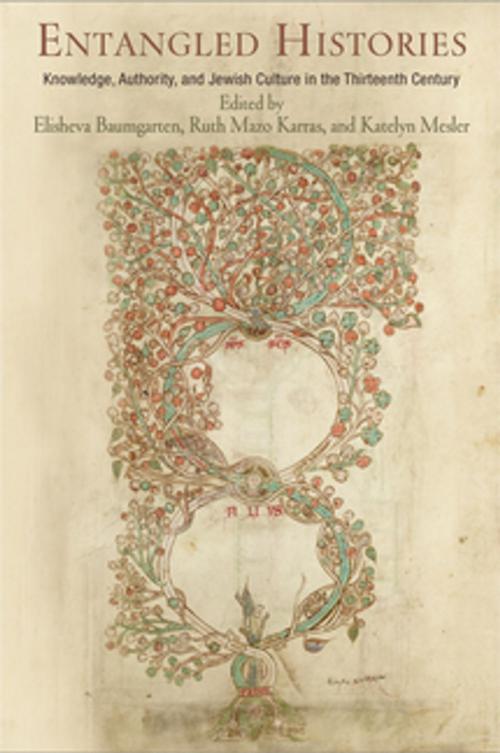Entangled Histories
Knowledge, Authority, and Jewish Culture in the Thirteenth Century
Nonfiction, History, Medieval, Jewish, Social & Cultural Studies, Social Science| Author: | ISBN: | 9780812293432 | |
| Publisher: | University of Pennsylvania Press, Inc. | Publication: | November 29, 2016 |
| Imprint: | University of Pennsylvania Press | Language: | English |
| Author: | |
| ISBN: | 9780812293432 |
| Publisher: | University of Pennsylvania Press, Inc. |
| Publication: | November 29, 2016 |
| Imprint: | University of Pennsylvania Press |
| Language: | English |
From Halakhic innovation to blood libels, from the establishment of new mendicant orders to the institutionalization of Islamicate bureaucracy, and from the development of the inquisitorial process to the rise of yeshivas, universities, and madrasas, the long thirteenth century saw a profusion of political, cultural, and intellectual changes in Europe and the Mediterranean basin. These were informed by, and in turn informed, the religious communities from which they arose. In city streets and government buildings, Jews, Christians, and Muslims lived, worked, and disputed with one another, sharing and shaping their respective cultures in the process. The interaction born of these relationships between minority and majority cultures, from love and friendship to hostility and violence, can be described as a complex and irreducible "entanglement." The contributors to Entangled Histories: Knowledge, Authority, and Jewish Culture in the Thirteenth Century argue that this admixture of persecution and cooperation was at the foundation of Jewish experience in the Middle Ages.
The thirteen essays are organized into three major sections, focusing in turn on the exchanges among intellectual communities, on the interactions between secular and religious authorities, and on the transmission of texts and ideas across geographical, linguistic, and cultural boundaries. Rather than trying to resolve the complexities of entanglement, contributors seek to outline their contours and explain how they endured. In the process, they examine relationships not only among Jewish, Christian, and Muslim communities but also between communities within Judaism—those living under Christian rule and those living under Muslim rule, and between the Jews of southern and northern Europe. The resulting volume develops a multifaceted account of Jewish life in Europe and the Mediterranean basin at a time when economic, cultural, and intellectual exchange coincided with heightened interfaith animosity.
Contributors: Elisheva Baumgarten, Piero Capelli, Mordechai Z. Cohen, Judah Galinsky, Elisabeth Hollender, Kati Ihnat, Ephraim Kanarfogel, Katelyn Mesler, Ruth Mazo Karras, Sarah J. Pearce, Rami Reiner, Yossef Schwartz, Uri Shachar, Rebecca Winer, Luke Yarbrough.
From Halakhic innovation to blood libels, from the establishment of new mendicant orders to the institutionalization of Islamicate bureaucracy, and from the development of the inquisitorial process to the rise of yeshivas, universities, and madrasas, the long thirteenth century saw a profusion of political, cultural, and intellectual changes in Europe and the Mediterranean basin. These were informed by, and in turn informed, the religious communities from which they arose. In city streets and government buildings, Jews, Christians, and Muslims lived, worked, and disputed with one another, sharing and shaping their respective cultures in the process. The interaction born of these relationships between minority and majority cultures, from love and friendship to hostility and violence, can be described as a complex and irreducible "entanglement." The contributors to Entangled Histories: Knowledge, Authority, and Jewish Culture in the Thirteenth Century argue that this admixture of persecution and cooperation was at the foundation of Jewish experience in the Middle Ages.
The thirteen essays are organized into three major sections, focusing in turn on the exchanges among intellectual communities, on the interactions between secular and religious authorities, and on the transmission of texts and ideas across geographical, linguistic, and cultural boundaries. Rather than trying to resolve the complexities of entanglement, contributors seek to outline their contours and explain how they endured. In the process, they examine relationships not only among Jewish, Christian, and Muslim communities but also between communities within Judaism—those living under Christian rule and those living under Muslim rule, and between the Jews of southern and northern Europe. The resulting volume develops a multifaceted account of Jewish life in Europe and the Mediterranean basin at a time when economic, cultural, and intellectual exchange coincided with heightened interfaith animosity.
Contributors: Elisheva Baumgarten, Piero Capelli, Mordechai Z. Cohen, Judah Galinsky, Elisabeth Hollender, Kati Ihnat, Ephraim Kanarfogel, Katelyn Mesler, Ruth Mazo Karras, Sarah J. Pearce, Rami Reiner, Yossef Schwartz, Uri Shachar, Rebecca Winer, Luke Yarbrough.















